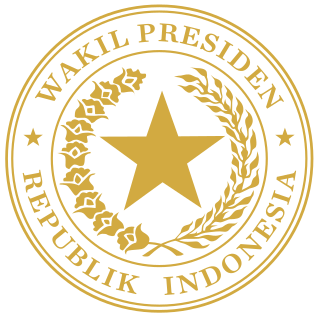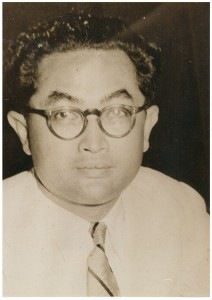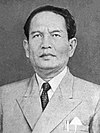
Sukarno was an Indonesian statesman, orator, revolutionary, and nationalist who was the first president of Indonesia, serving from 1945 to 1967.

The Constitutional Assembly was a body elected in 1955 to draw up a permanent constitution for the Republic of Indonesia. It sat between 10 November 1956 and 2 July 1959. It was dissolved by then President Sukarno in a decree issued on 5 July 1959 which reimposed the 1945 Constitution.

The Emergency Government of the Republic of Indonesia was established by Indonesian Republicans after the Netherlands occupied the at the time capital city of Yogyakarta in Central Java, the location of the temporary Republican capital during the Indonesian National Revolution. It was established in the city of Bukittinggi and led by Sjafruddin Prawiranegara.

The president of the Republic of Indonesia is the head of state and head of government of the Republic of Indonesia. The president is the leader of the executive branch of the Indonesian government and the supreme commander of the Indonesian National Armed Forces and the Indonesian National Police. Since 2004, the president and vice president have been directly elected to a five-year term, once renewable, allowing for a maximum of 10 years in office. The current president of Indonesia is Prabowo Subianto, who assumed office on 20 October 2024.

The vice president of the Republic of Indonesia is second-highest officer in the executive branch of the Indonesian government, after the president, and ranks first in the presidential line of succession. Since 2004, the president and vice president are directly elected to a five-year term.

Sjafruddin Prawiranegara was an Indonesian statesman and economist. He served in various roles during his career, including as head of government in the Emergency Government of the Republic of Indonesia, as Minister of Finance in several cabinets, and as the first Governor of Bank Indonesia. Sjafruddin later became the prime minister of the Revolutionary Government of the Republic of Indonesia, a shadow government set up in opposition to the country's central government.

The First Hatta Cabinet was Indonesia's seventh cabinet. It was formed by Vice President Mohammad Hatta, who was instructed to do so by President Sukarno on 23 January 1948, the same day the previous cabinet was declared dissolved. Following the second Dutch military aggression, when the republican capital of Yogyakarta was seized and most of the cabinet arrested, much of the cabinet was captured and sent into exile, although it was not formally disbanded. After the political leadership returned effective 13 July 1949 the cabinet continued its mandate until it was reshuffled on 4 August.

Sjafruddin Prawiranegara's Emergency Cabinet was the government of the Emergency Government of the Republic of Indonesia (PDRI), effectively Indonesia's government in exile, established in Bukittinggi, West Sumatra following the second Dutch military aggression when the republican capital of Yogyakarta was seized and most of the cabinet allowed itself to be captured in the hope of attracting sympathy from the outside world.

Teuku Mohammad Hasan was an Indonesian politician and national hero from Aceh, who served as the first and only governor of Sumatra from 1945 until 1948. He also served as a cabinet minister in Sjafruddin Prawiranegara's emergency cabinet and was a member of both the Senate of the United States of Indonesia (USI) and the Provisional People's Representative Council (DPRS) of the Republic of Indonesia.
National Hero of Indonesia is the highest-level title awarded in Indonesia. It is posthumously given by the Government of Indonesia for actions which are deemed to be heroic, defined as "actual deeds which can be remembered and exemplified for all time by other citizens" or "extraordinary service furthering the interests of the state and people". The Ministry of Social Affairs gives seven criteria which an individual must fulfill, as follows:
- Have been an Indonesian citizen who is deceased and, during his or her lifetime, led an armed struggle or produced a concept or product useful to the state;
- Have continued the struggle throughout his or her life and performed above and beyond the call of duty;
- Have had a wide-reaching impact through his or her actions;
- Have shown a high degree of nationalism;
- Have been of good moral standing and respectable character;
- Never surrendered to his or her enemies; and
- Never committed an act which taints his or her legacy.

Alexander Andries Maramis, more commonly known simply as A. A. Maramis, was an Indonesian politician and National Hero of Indonesia, who was involved in the struggle for independence. He was a member of the Investigating Committee for Preparatory Work for Independence (BPUPK), the organization which drafted the Constitution of Indonesia. In the early stages of the Indonesian government, following the Proclamation of Independence, he served as both Minister of Finance and Minister of Foreign Affairs. After the end of the Indonesian National Revolution, he served as the Indonesian ambassador to several nations, including the Philippines, West Germany, and the Soviet Union.

The Indonesian Muslims' Party, better known by the syllabic abbreviation Parmusi, was an Islamic political party in Indonesia which existed from 1968 until 1973. Founded as the legal successor to the Masyumi Party, it came fourth in the 1971 Indonesian legislative election, winning 5.36% of the vote and 24 seats in the People's Representative Council. In 1973, Parmusi was merged into the United Development Party.

Brig. Gen. Daan Jahja or Daan Yahya was an Indonesian military officer who was the Chief of Staff of the Siliwangi Division in 1948 and the Military Governor of Jakarta from 1949 to 1950.

Sartono was an Indonesian politician and lawyer who served as the first speaker of the House of Representatives (DPR) from 1950 until his resignation in 1960. He also served as acting president several times in his capacity as speaker following the resignation of Mohammad Hatta. Born into a Javanese family of noble blood, Sartono studied law at Leiden University. During his studies, he joined the Perhimpoenan Indonesia association and became an advocate for Indonesian independence. After graduating, he opened a law practice and helped found the Indonesian National Party (PNI) in 1927. He unsuccessfully defended the party's leaders when they were arrested by the colonial government in 1929.

Lukman Hakim was an Indonesian economist and diplomat who served as Minister of Finance between 1948 and 1950, serving under both the Emergency Government of the Republic of Indonesia and the Republic of Indonesia during the United States of Indonesia period. He was also the Governor of Bank Indonesia between 1958–1959, and the Ambassador to West Germany between 1961 and his death in 1966.

Prawoto Mangkusasmito was an Indonesian politician who served as the final chairman of the Masyumi political party before its dissolution in 1960. He also served as the Deputy Prime Minister of Indonesia during the Wilopo Cabinet between 1952 and 1953.

Margono Djojohadikusumo was an Indonesian politician and banker. He was the founder and the first president of Bank Negara Indonesia, and was also a member of the Investigating Committee for Preparatory Work for Independence (BPUPK). He was also the paternal grandfather of Indonesian President Prabowo Subianto.

















